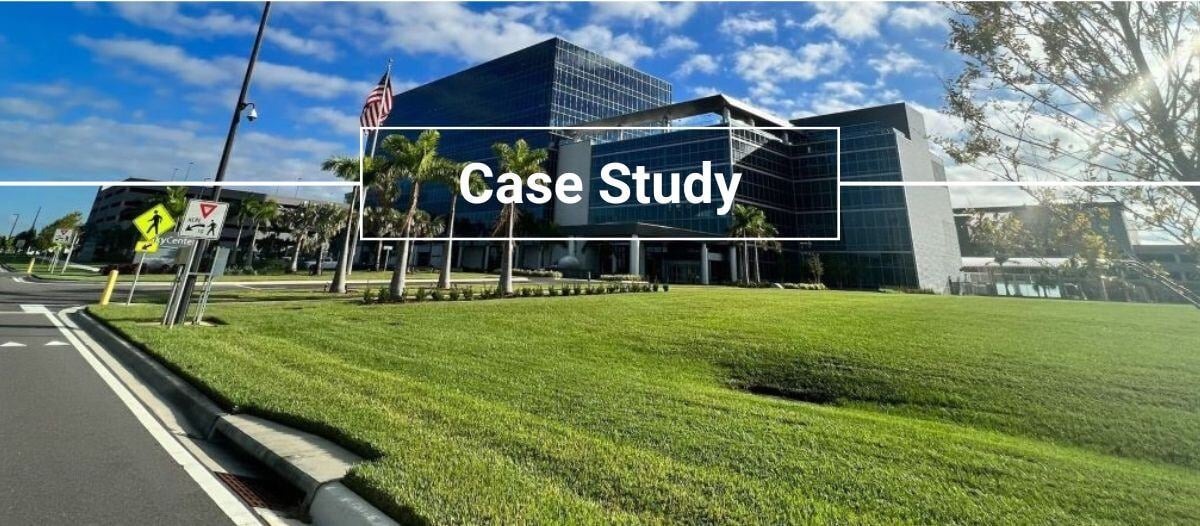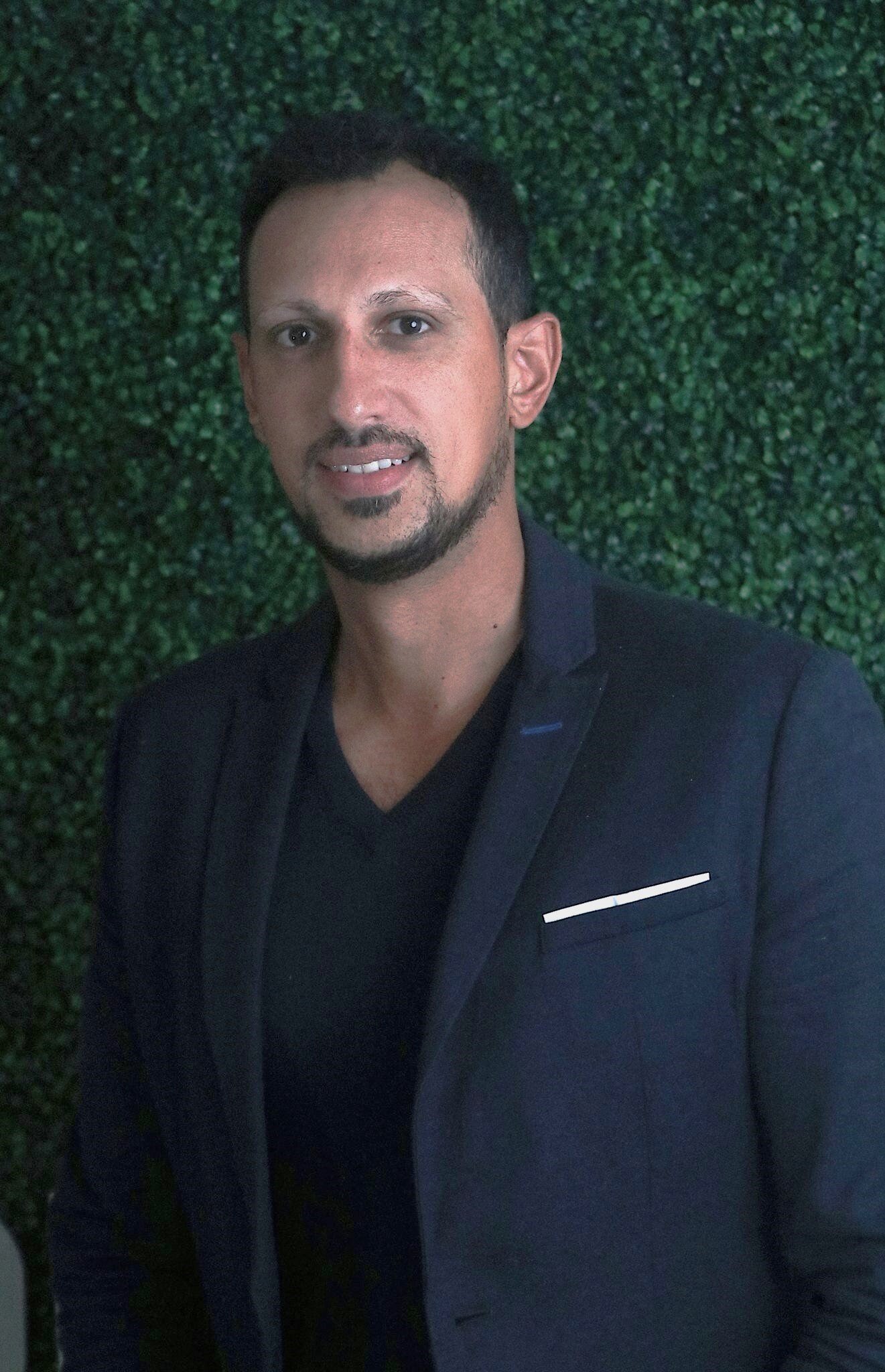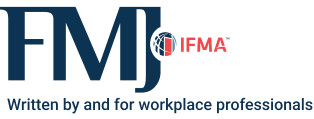Case Study: Content Management in the Workspace
Enhancing workplace experiences through content management

Tampa International Airport in Tampa, Florida, USA, is a bustling transportation hub, accommodating 6,734 monthly flights across global destinations. In 2022, this aviation epicenter, overseen by the Hillsborough County Aviation Authority (HCAA), relocated its operations to an innovative office complex known as SkyCenter One.
Designed to accommodate the rigorous administrative demands of the HCAA, the nine-story collaborative hub prioritizes activity-based work, streamlined global collaboration, efficient space utilization and user-friendly navigation. In addition to the HCAA team, multiple tenants take advantage of the building’s location and advanced workplace amenities, including more than 280 hot desks and meeting spaces, complemented by a state-of-the-art fitness center, conference center and ample common centers. At the core of the building's success lies a robust technological framework backed by a powerful, adaptive and user-friendly content management system (CMS), which helps the facility managers of SkyCenter One meet the evolving needs of a dynamic hybrid workforce.
FMs face a crucial challenge to address the ever-evolving demands of today's dynamic workforce and its growing expectations for flexibility, personalization and transparency. Outdated communication methods and fragmented technologies have become inadequate, leaving managers under increasing pressure to deliver exceptional workplace experiences. To create a competitive workplace experience for all stakeholders, FMs should consider implementing a robust content management system as the central hub of their ecosystem.
Simple, efficient facility-wide communications
Communication is the foundation of modern work: 86 percent of employees and team leaders cite poor communication strategies and a lack of collaboration as the leading cause of workplace failures. The facility’s technology infrastructure must make it simple to communicate consistently, and FMs are often responsible for ensuring the right tools and capabilities are in place.
Managing communication across multiple platforms can be daunting and time-consuming, potentially costing an employee up to 9 percent of working time each year. FMs can substantively reduce this lost productivity by streamlining campus-wide communications. With a unified CMS backend, they can deploy a consistent interface across multiple screens and streamline access to key enterprise systems. Workers can access the systems and tools they need to collaborate and succeed across digital signs, kiosks, video walls, desktops and mobile app experiences.
Using a reliable CMS platform, facility managers can create a custom campus operating system that can be used for everything from wayfinding to help desk ticketing. The system should not need to be built from scratch, however: API integrations allow FMs to automate content updates by drawing on the organization’s existing systems of record for real-time occupancy, directory, schedule, presence and more. This reduces the time and labor required to keep messaging current and supportive. A CMS partner should provide a unified backend with templates and branding tools for transforming API data into custom content, enabling consistent messaging throughout the facility without massive investment.
Dynamic CMS solutions can also offer a competitive advantage for tenants’ experiences. Modern work requires consistent communication that reaches on-site communication channels like office workstations, digital signage and kiosks, as well as remote and hybrid workstations, workplace communication apps and mobile devices. With options for multiple administrators to communicate using the CMS, organizations and stakeholders within a facility can tailor their messages to suit their communication requirements.
Advanced CMS platforms can streamline support by ensuring helpdesk resources are readily available to support seamless operations. For example, a CMS with Microsoft Teams Room or WebEx device takeover capabilities can help managers distribute how-to guides and troubleshooting documentation directly to collaboration devices as a screensaver – and even allow users to issue troubleshooting tickets directly from their device if they cannot self-service.
SkyCenter One demonstrates successful, seamless communication and content distribution requirements across spaces, from common rooms to tenants' dedicated offices. Leveraging a comprehensive CMS solution, FMs and administrators can easily create, edit and distribute messages across different devices. Whether the managers need to share scheduling or policy updates, disseminate news and schedules, or push instant alerts through the unified system in an emergency, the CMS empowers them to communicate efficiently and flexibly across all connected devices – even in a 275,000-square-foot facility.
Streamlining modern collaboration and space management
Due to the mass adoption of virtual collaboration tools, meeting rooms must support virtual and in-person participants. That said, 71 percent of office spaces adapted to accommodate hybrid work more efficiently could support four times their actual usage. Effective space management must be deployed to curtail this waste, allowing owners and tenants to extract more value from their investment in physical office space while supporting worker productivity and collaboration.
As coworking, hot-desking and hoteling trends grow, employees accustomed to dedicated workstations must adjust to shared spaces. Supportive technology is essential to ensure uninterrupted meetings and work, in-person or virtually. However, it must also be stable and strategic. Instead of continuously adding new platforms, technology makers should seek flexible platforms that adapt to the changing business and technology landscapes. This approach will enable enterprises to keep their tech stack under control while staying at the forefront of innovative workplace experiences.
An intelligent CMS can alleviate fragmentation by offering native APIs for seamless communication between the systems workers rely on daily, such as Google Workspace, Zoom, Cisco WebEx and Microsoft Teams. A modern CMS streamlines reservations and scheduling for meeting rooms, desks or offices, all from a user-friendly interface integrated into the same backend used for content distribution. Employees can reserve desks, offices or meeting spaces from anywhere they please via signage, desktop or mobile. They can also check coworker availability, reserve meeting spaces, schedule video conferences and submit maintenance requests. Accessories like occupancy controls, badge scanners and sensors automatically update space utilization and status, facilitating better resource allocation and efficiency for facility managers and building occupants.
In the context of SkyCenter One, it was evident that custom and integrated technologies are valuable for collaboration and space management. The HCAA and its fellow tenants work on various hybrid models with different work arrangements. Some employees work in the office five days a week, while others would need to work in the office for a project for two weeks, then remotely for several weeks. Visitors may simply need a space to work for one day out of the year. Regardless of the work configuration, the facility’s custom Sky Reserve app simplifies workplace management for users and FMs.
The app offers a range of features designed to streamline and enhance the workplace experience. The building has a digital ecosystem that includes smart sensors for desk booking. These sensors show real-time information about available workspaces, giving staff a more connected in-person experience and helping them manage the space more effectively. Users can easily reserve meeting rooms for varying durations – a day, a week or longer. Additionally, they can efficiently locate colleagues within the building and seamlessly navigate 3D floor plans without any disruptions. The app also allows selecting room and furniture layouts when making space reservations.
The CMS streamlines logistical management and enhances user experiences by automating requests and scheduling. Users can request AV support and technology accommodations and even input catering orders through the CMS, which facility staff can prepare for immediate use before the user's arrival. The app integrates with Microsoft Office 365, automatically recording and sharing facility-wide calendars and ensuring tenants, visitors and management teams know space availability.
Advanced wayfinding supports efficiencies
A robust CMS can improve workplace experiences by offering interactive wayfinding tools for signage and mobile. Users can view directories and obtain directions on public screens or transfer the digital experience to their mobile devices via QR codes or app integration.
When integrated with the space management tools outlined above, wayfinding enhances efficiency by allowing users to locate spaces or colleagues within the facility quickly and view present space availability and resources for last-minute space management needs. Additional features such as 3D maps, fastest-route generators, ADA-accessible routing, augmented reality features like camera view and popups, integrated GPS navigation and real-time location updates make navigating the facility more accessible and efficient.
SkyCenter One offers a convenient wayfinding feature through the Sky Reserve App. This feature makes it easy for HCAA employees and other tenants to locate their offices and colleagues and grants them hassle-free access to reserved spaces. In addition, visitors can use public wayfinding kiosks to find businesses, events and other public facilities. The directions displayed on these kiosks can be easily transferred to mobile devices by scanning QR codes.
This custom app experience highlights the importance of flexible design. Every individual has different requirements and requests for their workplace. For FMs, using a CMS that does not lock the facility into one-size-fits-all solutions is essential. As a building’s population changes over time, the tenants may require new solutions such as support for multiple foreign languages, accommodations for occupants with visual impairments or physical disabilities, or custom routing around secure or under-construction zones. The CMS should adapt to the facility's population and seamlessly guide individuals to their destination.
Advanced CMS backends can now offer custom wayfinding with AI assistance, revolutionizing the wayfinding experience by equipping users with a digital assistant on signage or personal devices. This integration allows users to receive specific navigation instructions based on their unique preferences by simply inputting a question via voice or text. For those whose primary language is not English, these tools can automatically translate information and make the environment more accessible to the global workforce.
Data-informed management
Data-driven insights are essential to optimize workplace design and enhance user experiences. The right CMS will allow FMs to build data visualizations and KPI dashboards surfacing critical information from across a facility’s application stack. Such systems can save customers thousands of hours per year that would otherwise be spent sifting through analytics from multiple systems to understand project status and team performance.
Evolving work styles make data analysis increasingly crucial for workforce engagement. Although hybrid work gives employees more flexibility and autonomy, it can only be effective if it fosters collaboration and teamwork. To ensure that the employees remain engaged, productive and efficient, managers must have direct insight into their staff's experiences and requirements.
FMs at SkyCenter One rely on the CMS ecosystem to gain accurate insights into space utilization patterns. The Sky Reserve app provides valuable data that helps administrative teams analyze average meeting durations, total bookings and space usage frequencies. This data is reported from secure mobile authentications that protect user data and help ensure that the office environment is not accessible to unauthorized users. The app also pulls user data from Active Directory, allowing facility managers to see personalized space-use information. With detailed analytics on hotdesking and hoteling, managers can gain a clear perspective for optimizing schedules, in-room technology maintenance, sanitation routines and more.
Futureproofing facilities with CMS solutions
As business evolves, technology demands shift and can become outdated without the proper precautions. Enterprises need CMS solutions that meet today’s needs while adapting to future advancements. Effective content management requires constant improvement and innovation to meet workplace management demands.
For example, CMS platforms that integrate generative AI support facility managers in creating intelligent, adaptive workplaces. With ChatGPT applications, companies can offer multilanguage chat interfaces that answer organization- or site-specific questions via text or voice. Trained AI models in internal knowledge centers can also improve internal knowledge centers and training documentation, making resources readily available to an increasingly diverse global workforce. Meanwhile, AI can also support real-time recommendations and augmented reality features to enhance space management and wayfinding.
It is also essential for a CMS to be scalable to accommodate future changes. The CMS partner should demonstrate the ability to support the system in the long term, evolving with the growth of the facility’s operations and keeping up with the constantly changing standards of modern work. This ensures the platform will remain valuable, contributing to operational progress and supporting a facility’s reputation.
As demonstrated by SkyCenter One, modern CMS technology can help facility managers meet employee expectations for collaboration, optimize space utilization and leverage insights to create engaging workplace experiences. To keep up with the ever-changing expectations of the workforce and future-proof facilities, it is crucial to identify a CMS partner that offers innovative, scalable and well-integrated functionalities. This is an investment in the current workplace and the facility’s future.

Tomer Mann, chief revenue officer at 22Miles, has more than 15 years of expertise in digital signage. Committed to enhancing visual communication services for diverse sectors, he innovates to simplify digital content and elevate user experiences.
References
"Workplace Communication Statistics (2022)." Pumble. Accessed Oct. 11, 2023. https://pumble.com/learn/communication/communication-statistics/
“How Much Time and Energy Do We Waste Toggling Between Applications?” Harvard Business Review, August 2022. https://hbr.org/2022/08/how-much-time-and-energy-do-we-waste-toggling-between-applications
Return-to-Office Reality Not Meeting Expectations: 71 Percent of Spaces Can Support 4x Actual Usage." BusinessWire. Density, October 5, 2022. https://www.businesswire.com/news/home/20221005005203/en/
Read more on Communication , Performance & Quality and Workplace
Explore All FMJ Topics







